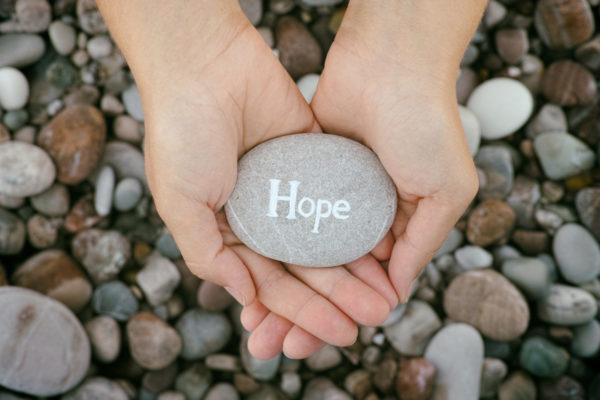What Do You Hope For?
3 Strategies for Greater Hope During These Uncertain Times
What do you hope for? Even during times of uncertainty, adversity, and life’s transitions, hope can endure.
The idea that hope can survive even during tough times, may feel counter-intuitive. According to researcher Barbara Fredrickson, PhD, (2020), we can recognize all our feelings and “when that fear is paired with looking toward the positive, then it becomes hope,” leaving us with new possibilities. We can own the whole of all our feelings – positive emotions and difficult emotions – while looking for cracks and corners where we can notice glimmers of light.
Psychiatrist Viktor Frankl (1959), who survived the Auschwitz Nazi death camp during World War II, wrote about survival in even the worst situations. From the work of Dr. Frankl, we learn that we always have a choice – that emotional health is influenced by the attitudes we choose, the decisions we make, and the desire to look forward rather than backward. Research has consistently related hope to emotional and physical well-being, positive relationships, and effectiveness in academics and athletics (Rand & Cheavens, 2009; Snyder, 2002).
Hope can be practiced at multiple levels. Studying hope in people experiencing chronic pain, researchers Eaves and colleagues (2016) propose several categories of hope:
1. Practical/Realistic Hope – Understanding the situation and hoping for a realistic, probable, positive change.
2. Utopian Hope – Focusing outward with the hope that collective action can lead to a positive outcome for all (Eaves et al, 2017; Webb, 2007).
3. Wishful Hope – This kind of hope is not necessarily “realistic”, but can help with coping and continuing to seek strategies for improvement.
4. Transcendent/Existential Hope – Rather than focusing on a specific outcome, transcendent hope is open-ended, envisioning good things that can happen in a more general or global sense.
Guiding ourselves toward hope is a choice we can make even during uncertain times. According to hope theory, hope involves a belief that we have the capacity, pathways, and resolve to reach toward our goals (Snyder, Rand, Sigmond, 2002; Snyder, 2000). Hope theory shifts hope from wishful thinking to doing with intentional goal-oriented motivation and action (Feldman & Dreher, 2011). Hope theory posits three components: (1) Having a goal; (2) Agency, the motivation and determination that the goal can be achieved; and (3) Pathways, a plan for reaching the goal.
You can get a snapshot about how hopeful you are by taking the hope test (Snyder & colleagues, 1991). This hope scale takes just a few minutes to complete and can give you a glimpse into your goal-directed thinking at this point in time. Find the hope scale here.
🌼 3 Strategies to Guide Yourself Toward Greater Hope
1 – To restore our capacity for hope, we can begin by savoring. Paying attention to even the briefest moments of goodness offers opportunities for hope and renewal. Savoring is an easy skill we can practice by simply noticing what’s happening right now in this moment, and then pausing briefly to enjoy it. Noticing is possible for all of us.
Here are a few examples of moments we might savor:
- Experiencing the beauty of the sunshine
- Noticing a flower growing as you walk outside or look out the window
- Sitting in the comfort of your favorite chair
- Looking at an old photo that brings warm memories
- Tasting the delicious first bite of the food you enjoy
- Listening to the voice of your loved one.
2 – Gratitude acknowledges and connects us to life’s goodness. The practice of gratitude involves paying attention to what we are thankful for and has emotional, physical, and interpersonal benefits (Emmons, 2007).
According to research conducted by psychologist Robert Emmons, PhD (2007), writing daily in a gratitude journal is one of the most effective strategies to increase thankfulness and gain its benefits. Although there’s no specific right way to do this, paying attention to what you are grateful for each day is quite effective. Why write? Evidence shows that putting thoughts into the language of words is more effective than just thoughts.
3 – Wherever your hope score is now, hope is like a muscle and can be strengthened:
- Have a goal. Having a goal offers direction to help you guide yourself forward. A goal that is specific and positive is likely to be more effective than a vague, general goal. Consider self-inquiries, such as: What do I really want? What question am I trying to answer? How important is this to me and why?
- Create an actionable pathway toward your goal. Generate one or more routes toward the destination and alternative options if the first pathway doesn’t get you there. What are your options? What else might you try if needed?
- Engage your sense of agency and self-efficacy (Snyder, Rand & Sigmond, 2002; Bandura, 1997). Boost your motivation with affirming messages that strengthen your confidence to continue toward your goal even when you confront obstacles. Examples of hopeful self-talk: “I can work my way toward this,” “I’ll keep trying despite the obstacles,” or “Things will work out in the end.”
- Visualize yourself reaching your goal. Pause daily and imagine yourself actually achieving your goal (Dreher, 2008). Invite yourself to visualize this achievement in the present moment, imagining the thoughts and feelings you are experiencing as you reach your objective and live your new reality.
🙂 Summary Steps Toward Greater Hope
- Savor even the smallest good moments.
- Pay attention to what you are thankful for.
- As you’re ready to guide yourself toward greater hope, set a goal to establish your direction.
- Develop a few steps to steer toward your destination and alternative options if you need them.
- Motivate yourself with positive self-talk along the way.
- Visualize yourself reaching your goal.
- Experience a sense of hope as you take action toward achieving your goals.
Send your comments and suggestions to Ilene!
Click here to send Ilene an email with your thoughts about this blog post.
References:
- Dreher, D. (2008). Your personal renaissance: 12 steps to finding your life’s true calling. Philadelphia, PA: Da Capo Press.
- Eaves, E. R., Nichter, M., & Ritenbaugh, C. (2016). Ways of hoping: navigating the paradox of hope and despair in chronic pain. Culture, Medicine, and Psychiatry, 40(1), 35-58.
- Emmons, R. (2007). Thanks! How the new science of gratitude can make you happier. Boston, MA: Houghton Mifflin Company.
- Feldman, D.B. & Dreher, D. (2011). Can hope be changed in 90 minutes? Testing the efficacy of a single-session goal-pursuit intervention for college students. Journal of Happiness Studies, 13, 45-59.
- Frankl, V. (1959). Man’s search for meaning. New York, NY: Washington Square Press.
- Fredrickson, B.L. (May, 2020). Positivity and Tragedy. Online Lunch & Learn, Marlene Meyerson JCC Manhattan & Wholebeing Institute.
- Rand, K.L. & J.S. Cheavens. (2009). Hope theory. In S.J. Lopez & C.R. Snyder (Eds.) The Oxford Handbook of Positive Psychology, 2, (323-333). New York, NY: Oxford University Press.
- Snyder, C.R. (Ed.). (2000). Handbook of hope: Theory measures, and applications. San Diego, CA: Academic.
- Snyder, C. R. (2002). Hope theory: Rainbows in the mind. Psychological Inquiry, 13, 249-275.
- Snyder, C. R., Harris, C., Anderson, J. R., Holleran, S. A., Irving, L. M., Sigmon, S. T., et al. (1991). The will and the ways: Development and validation of an individual-differences measure of hope. Journal of Personality and Social Psychology, 60, 570-585.
- Snyder, C.R., Rand, K.L. & Sigmon, D.R. (2002). Hope theory: A member of the positive psychology family. In C.R. Snyder & S. Lopez (Eds.), Handbook of Positive Psychology (257-275). New York, NY: Oxford Press.
Copyright © 2021 Ilene Berns-Zare, LLC, All Rights Reserved
Ilene is a Featured Author on PsychologyToday!
Read her blog series Flourish and Thrive: Navigating transitions with mindfulness and resilience.

What do you hope for?
Tap into your strengths, purpose, and potential to flourish in life and work.
If you’d like to discuss how Ilene Berns-Zare Coaching can help you achieve your goals, Contact Ilene.
Coaching with Ilene Can Help You Call Yourself to Action
Ilene Berns-Zare, PsyD, PCC, CMC (ICF Credentialed) is an Executive and Personal Coach and Speaker. Ilene helps people live their best personal and professional lives by bringing mind, body, and spirit into flow with strengths, purpose, and potential. She inspires clients to find fresh perspectives and access their full potential as creative, resourceful, whole persons. Find Ilene online, set up a free discovery coaching consultation, and access free resources at https://ibzcoaching.com/.
Please share this blog with anyone who might be interested in reading it!
We would love to hear from you! We are interested in your suggestions for this newsletter, your reactions to this one, or providing more information about coaching.




